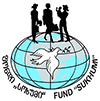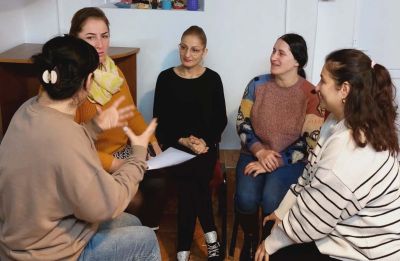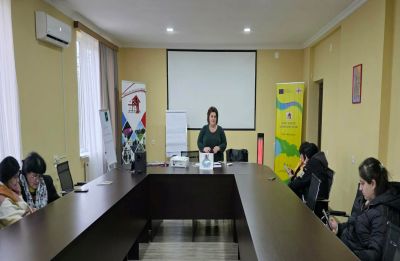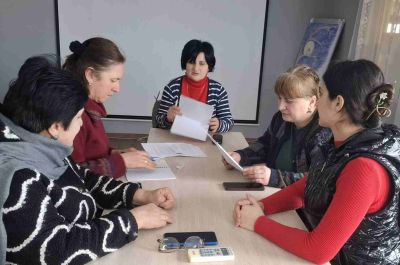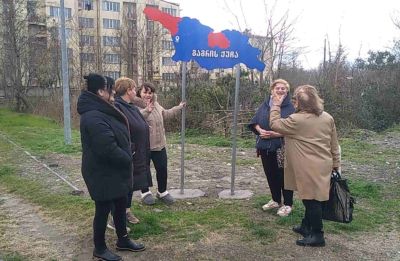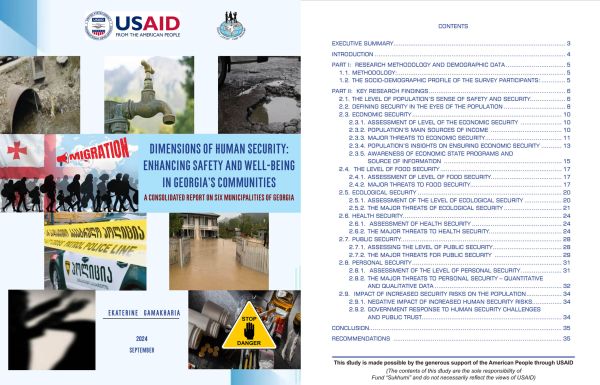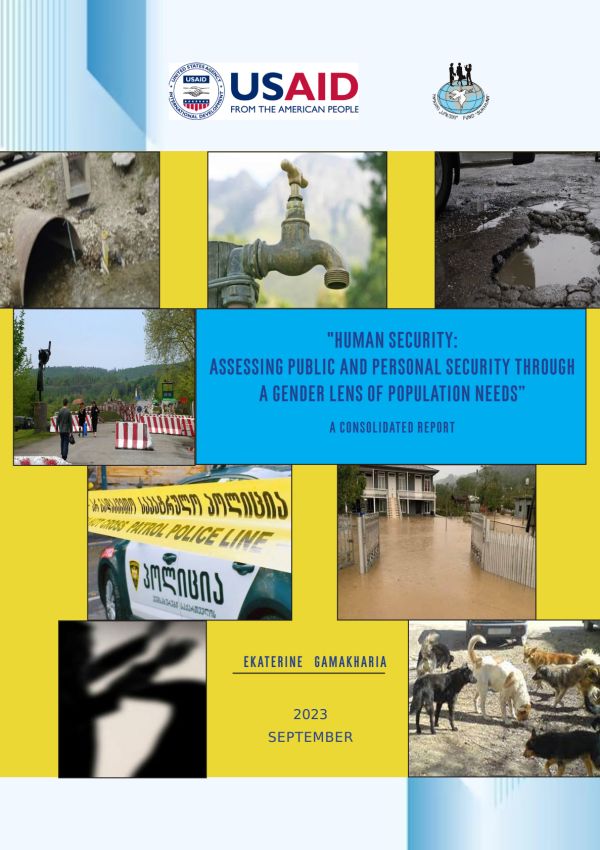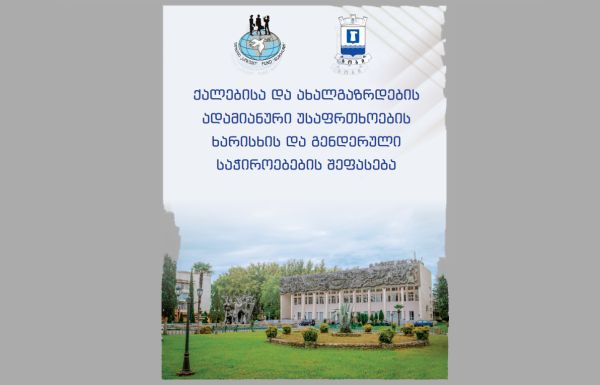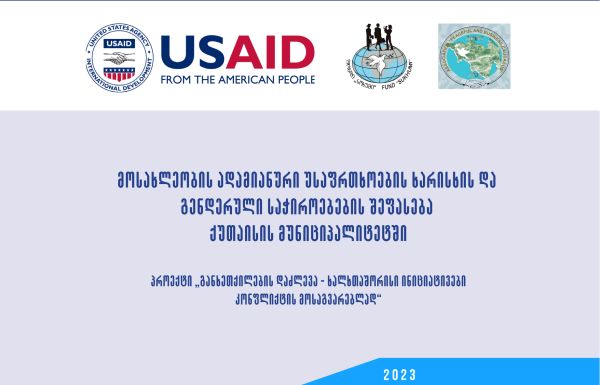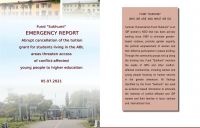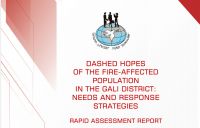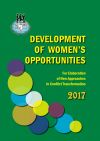Women, Peace and Security
Women Fund Sukhumi is pleased to introduce the research report "Dimensions of Human Security: Enhancing Safety and Well-Being in Georgia’s Communities." This research aimed to assess the level of human security across six municipalities in Georgia: Zugdidi, Tsalenjikha, Senaki, Kutaisi, Tskaltubo and Khoni. Engaging a diverse range of participants, the study examines various dimensions of security-including economic, public, food, personal, health, and environmental aspects-offering insights into the unique challenges faced by different community groups.
The main finding of the study is that the overall sense of security across different categories and dimensions in the municipalities is at a middle point, with most participants rating their sense of security at level 3 on a 5-point scale, indicating moderate perceptions of safety and well-being. The report presents recommendations for addressing these challenges and improving overall community well-being and safety.
The Women's Fund "Sukhumi" is pleased to introduce a research report titled: “Human Security: Assessing Public and Personal Security through a Gender Lens of Population Needs”.
This research aimed to explore the level of human security within the six designated municipalities where our organization operates: Zugdidi, Tsalenjikh, Senak, Kutaisi, Tskaltubo, and Khoni.
The primary objectives of this research were twofold: first, to assess the extent of the population's sense of security, both in the public sphere and within their personal lives; and second, to identify the specific risks and needs that contribute to feelings of vulnerability and insecurity among community members.
By pinpointing these key findings, our aim is to offer strategies and recommendations that can effectively address these issues. Furthermore, we are committed to advocate for positive changes, both locally and on broader scales, encompassing national and international levels.
The report was published within the USAID-supported project - "Bridging the Divide - People-to-People Initiatives for Conflict Resolution"
The project is implemented with the support of the USAID
With the support of Khobi local government and in frames of the memorandum signed with the municipality, the research was conducted and a report “Assessment of the quality of human security and gender needs of women and youth” was published.
The research is based on the Gender Responsive Early Warning System (GREWS). As a result of qualitative and quantitative research, a high level of vulnerability of the population in relation to various categories of human security was revealed.
There are many acute economic, social, and infrastructural problems. The need to strengthen citizen participation in the development of state or local programs was identified, which will help to reflect the population necessities in the local budget and to solve problems. In answer to the challenges reflected in the research, the recommendations were prepared.
Assessment of the quality of human security and gender needs of the population is a systematized report based on quantitative and qualitative research conducted in six municipalities.
The main goal of the research was to assess the attitude of various groups of society towards human security issues in the fields of public and personal security.
The recommendations developed on the basis of the research will be used for the advocacy campaigns in terms of human security in Kutaisi, Tskaltubo, Khoni, Zugdidi, Tsalenjikha and Senaki municipalities.
Kutaisi Khoni Senaki Tskaltubo Tsalenjikha Zugdidi
The project is implemented with the support of the USAID
The publication “Needs Assessment of Women and Youth according to the Gender Responsive Early Warning System (GREWS)” was prepared. This is an analysis of a study carried out in 6 municipalities (Kutaisi, Khoni, Tskaltubo, Senaki, Tsalenjikha, Zugdidi).
The Gender Responsive Early Warning System (GREWS) is an effective tool for early response to population problems.
The aim of the research is to identify the problems of women and girls in six municipalities, identify prior issues and advocate them at the local and central levels.
The project is implemented with the support of the USAID
“Needs and priorities of IDP and conflict affected women living in Zugdidi municipality and the importance of their integration into local policy” - this is the title of a new Fund “Sukhumi’s” publication. Main conclusions, findings and recommendations identified as a result of the study will be submitted to local political parties. This will facilitate a full-fledged pre-election communication between women and local political actors and strengthen an appropriate feedback of political parties on the needs of their voters.
The project is implemented with the support of Kvinna till Kvinna,
women’s Foundation (Sweden)
Abrupt refusal to fund higher education tuition fee for students from Tsalenjikha and Zugdidi municipalities, living in villages along the conflict dividing line caused numerous socio-economic problems for them and their families. The recent emergency report of Fund “Sukhumi” highlights the main challenges caused by the cancellation of the “students grant” on the population, as well as provides specific recommendations to reduce the negative impacts.
The project is implemented with the support of the organization Brot
für die Welt - Evangelischer Entwicklungsdienst (Germany)
The Fund "Sukhumi" presents its new rapid assessment report – “Dashed hopes of the fire-affected population in the Gali district: Needs and response strategies”, which discusses priority needs and human security concerns of the population affected by the wildfires that broke out in January 2021 in the Gali district.

Fund “Sukhumi” systematically monitors and studies the situation of IDP and conflict affected women and girls living close to the conflict dividing line with Abkhazia and other locations with law degree of security and high risk of violence occurrence. To assess the situation of the population, we developed and launched Gender Responsive Early Warning System (GREWS), which is complex mechanism of gender sensitive conflict analysis. The study was conducted in September-December, 2020 and covered 11 target municipalities of Fund «Sukhumi» - Kutaisi, Tskaltubo, Terjola, Khoni, Senaki, Poti, Zugdidi (Koki, Khurcha, Shamgona, Kakhati), Tsalenjikha (Pakhulani, Tskoushi), Lanchkhuti, Ozurgeti, Kobuleti and the villages adjacent to the conflict dividing line in the Gali district (Nayui96evi and Saberio).
The new publication: „The Gender Dimension of the COVID-19 Crisis: Assessing the Efficiency of Pandemic Response” provides detailed information about the impact of pandemic on the human security of women and girls living in the target regions of Fund “Sukhumi” and describes population’s attitude towards the efficiency of the central and local authorities’ response to the pandemic.
The project is implemented with the support of Kvinna till Kvinna,
women’s Foundation (Sweden)

The Fund "Sukhumi" presents a new publication, “The Gender Dimension of the COVID-19 Pandemic and Its Impact on Human Security”, outlining the key challenges and problems faced by our beneficiaries, especially women and girls.
The rapid assessment aimed at exploring and studying the main problems and gender needs caused by the COVID-19 in the lives of the organization's beneficiaries and developing an appropriate and timely response strategy.
The rapid assessment analysis is published in two languages - Georgian and English.
